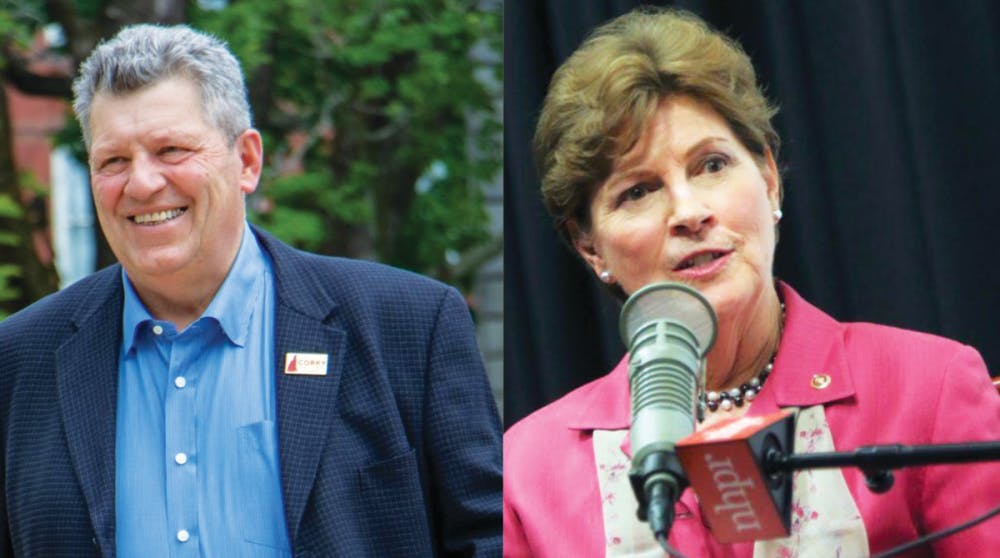On Thursday Oct. 15, NHPR continued their election debate series hosting former New Hampshire governor and incumbent Democrat Senator Jeanne Shaheen and Republican challenger, former army ranger and lawyer Corky Messner.
Messner opened the debate by immediately putting the attention on Shaheen, claiming that she is “loyal to the progressives in Washington D.C.” and that it is “time for a change.” Shaheen responded by highlighting her record as a senator, especially in the form of stimulus funding in the previous six months, and then attacked back at her opponent, claiming that Messner “walks lockstep with Mitch McConnel and D.C. Republicans.”
The first topic of the debate surrounded the Supreme Court nomination of Amy Coney Barrett. Shaheen responded by affirming that she will vote against the confirmation of Coney Barrett based largely around the justice’s positions on abortion and the Affordable Care Act. Shaheen further asserted that she will not support packing the court as a solution for Democrats, should Coney Barrett be confirmed.
When asked his thoughts on nominating a Supreme Court justice in an election year, Messner highlighted that both the Democrats, including Senator Shaheen, and Republicans have changed their opinion when it suits their political needs and that “elections have consequences.” Messner also affirmed his support for the nomination of Coney Barrett saying that she is “a role model for women everywhere.”
The debate then shifted toward the federal response to the coronavirus (COVID-19) pandemic. Messner highlighted the slow federal response to additional stimulus stating that “while people in New Hampshire need help, Democrats are playing politics.” Shaheen responded and blamed the Trump administration and Senate Republicans for holding out on parts of the stimulus such as additional unemployment funding and that their slow timing in coming to a compromise was a necessary to ensure these parts of the bill.
Next, the candidates began to discuss the ongoing debate for additional stimulus funding. The Chair of the Federal Reserve, Jermone Powell, said that the federal government needs to provide a lot more stimulus to Americans in order for the country to “avoid economic tragedy.” Senate Republicans pushed forward a bill that only has a fraction of the stimulus many economists think is needed to preserve the economy. Shaheen insisted that it is necessary to hold out for a larger deal as opposed to compromising on the bill that Senate Republicans created. Messner argued that the Republican bill will still help many Americans, and Democrat’s unwillingness to compromise is preventing the public from getting any assistance at all. Messner highlighted that Shaheen’s husband had taken out multiple Paycheck Protection Program (PPP) loans, a program which Shaheen co-authored, saying that this was “cronyism and corruption, just like the Biden family.”
Shaheen fought back, highlighting that Messner’s own law firm also benefited from PPP loans and that she had no role in administrating the loans. Messner defended his own record stating that he is not a sitting senator and that if he was, he would immediately divest his business holdings.
On the topic of health care, Messner asserted that he wants everyone, regardless of pre-existing conditions, to have access to health insurance but he would rather seek out those goals through market-based solutions as opposed to a government program. He additionally highlighted his goals for price transparency, cross-state sale of insurance, and a replacement to the Affordable Care Act to protect those with pre-existing conditions before repealing it.
Shaheen responded committing her support to expanding the Affordable Care Act and pursuing a public option for anyone to opt into Medicare for health care coverage.
The debate then shifted to foreign policy with the two candidates coming to some agreement that China is the largest foreign policy threat to the United States. Shaheen highlighted the foreign influence that China has begun to develop over the past decade, while Messner focused on the widescale intellectual property theft that has occurred in the past decade.
On the topic of climate change Messner voiced support for targeted incentives to help support the growth of electric cars, and green energy while avoiding regulations. He also pushed for the United States to become energy independent so that we no longer have to rely on bad actors to supply our energy needs. Shaheen highlighted her own record as a Senator working on bipartisan bills for energy efficiency as well as supporting the use of alternative energy sources such as natural gas and biofuels to help phase out oil and gas.
After being questioned on her continued support of qualified immunity, the legal principle that grants law enforcement immunity from prosecution under most circumstances, Shaheen voiced her commitment to accountability for law enforcement through the use of body cams, banning of chokeholds, and gaining accreditation for police departments. In response, Messner attacked Shaheen and other democrats for refusing to hold debate on a bill sponsored by Republican Sen. Tim Scott that would have provided many of the policy goals democrats are seeking on the topic. Shaheen responded claiming her lack of support for the bill was because it only made recommendations for law enforcement agencies and failed to put any new regulations into law.
The last topic of the debate surrounded gun regulations, especially red flag laws, which would allow for the confiscation of firearms owned by individuals of concern. Messner quickly affirmed that “our second amendment is a civil liberty” and he would not support red flag laws. Shaheen voiced her support for comprehensive background checks in order to “keep guns out of the hands of those wishing to do harm to themselves or others”.
Shaheen is currently leading polling in the Senate race 55% to Messner’s 40% as she looks to win her third term as senator.
Photo Courtesy of New Hampshire Public Radio












